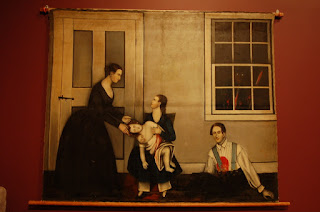CHAPTER FIVE- BLOOD WILL HAVE BLOOD
“Though your sins be like scarlet, they shall become white as snow; though they be red like crimson, they shall become as wool”- Hon. William W. Van Ness The Report of the Trials of the Murderers of Richard Jennings
There hadn’t been a hanging in Goshen since January 22, 1779, when Cowboys Claudius Smith and James Gordon were finally strung up, ending their reign of terror in Orange County. With Martin Van Buren’s referencing of Richard III, the Jennings tragedy had literally taken on Shakespearian proportions. Four men had been sentenced to die, and one pregnant female was languishing in the gaol. The Goshen gaol had become so busy, and “insecure,” with the curious, that the local militia had to be called out, enlisted to keep guard over the assassins; as everyone queued up for a peek. It was just like the old days when Goshen Sheriff Isaac Nicolls pleaded with Governor George Clinton for the militia to help guard the illusive Cowboys. The Governor denied the request, leaving Nicoll’s to suffer their embarrassing escape, before re-capturing, and hanging Smith and Gordon. And just like in the old days, the condemned were local celebrities. Everyone wanted a peek at the killers……… before it was too late.
Rev. Ezra Fisk sworn
By Mr. Fisk:
Q. How did Jack appear to be exercised in conversations you had with him?
A. Jack said he was sorry for what had happened. He sometimes appeared much distressed in mind; but I do not think he was really penitent, in the scriptural sense. I thought him under deep conviction, without any hope in Christ. He was generally grave and serious.
It was a certainty there would be a hanging. The only questions that remained were when, where, and how? The task fell to Goshen Sheriff Moses Burnett to accommodate whatever the execution required. Hanging four people at once was a bit of a structural head scratcher; so Burnett referred to the old ink drawing from the Smith/Gordon hangings, where they had only hanged two. Did they drop one at a time or all at once? How high was the cross beam from the deck, and the deck from the ground? What mechanism held and released the trap? Were there multiple traps, or just one long one? How heavy was the rope, and how long did it have to be? All these details had to be carefully worked out, not to make a mess of things. Four horses and a tree branch would just not suffice.
By the time the prosecution and defense rested in the matter of The People vs David Conklin it was a little after 3:00 pm on Monday March 8, 1819. James Teed was guilty. Jack Hodges was guilty. Hannah Teed had pled guilty (to a lesser charge), and a verdict of guilty on all counts was returned by the jury at 9:00 am the next morning in regard to The People vs. David Conklin. Jack Hodges would be called to the stand one last time, to testify against David Dunning.
Jack Hodges sworn
By the D.A.:
Q. What passed between you and Dunning Monday morning before Mr. Jennings came along?
A. We agreed to go into the woods to chopping wood. Dunning said that as soon as Mr. Jennings had heard us chopping, he would come there and we would kill him. Soon after this conversation Mr. Jennings come past.
Q. How long was it from the time you saw Jennings go passed, till you went got your gun?
A. I think it was about 3 mins.
Q. Why did you not go sooner?
A. I thought Mrs. Teed a good religious woman, and that what she said was right. I wanted to ask her once more about it, and if she had then said one word against it, I should not have stirred a single step on this business.
Q. Which way did Dunning go?
A. He went by the still house.
Q. From where the murder was committed, do you think the houses of Coe Teed and Vince Wood was in sight?
A. Both was in sight.
Q. When did you first miss the lock of the gun?
A. I did not know the lock was left until I got to Conklin’s.
Q. Was you groggy at the time of the murder?
A. I had been drinking so much that I felt it.
Q. Did Dunning give you any reason for wanting the old man dead, or was it the offered reward that tempted him?
A. Dunning said that it was not the money he would do it for, but that he was afraid he would lose his summer’s work, he had got not writing from him to show for it.
Vincent Wood sworn
By Mr. Storey:
Q. Are you acquainted with the prisoner [David Dunning] at the bar?
A. I have acquaintance with him.
Q. Do you not consider him a man rather below par, in point of rational abilities and intellectual powers?
A. I think him rather a weak-minded man.

Comments
Post a Comment